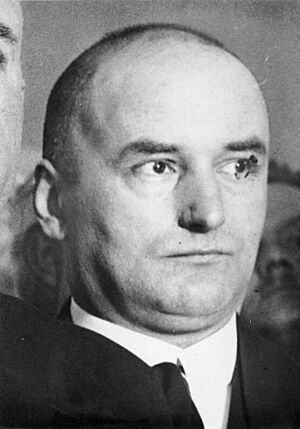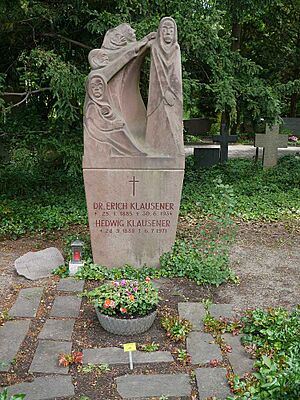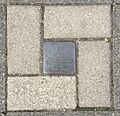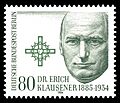Erich Klausener facts for kids
Quick facts for kids
Erich Klausener
|
|
|---|---|

Erich Klausener in 1933
|
|
| Personal details | |
| Born |
Erich Klausener
25 January 1885 Düsseldorf, Kingdom of Prussia, German Empire |
| Died | 30 June 1934 (aged 49) Berlin, German Reich |
| Parents | Peter Klausener (father) Elisabeth Biesenbach (mother) |
| Profession | Politician Professor |
| Known for | Head of Catholic Action Berlin |
| Religion | Roman Catholicism |
| Military service | |
| Allegiance | |
| Battles/wars | World War I |
Erich Klausener (born January 25, 1885 – died June 30, 1934) was an important German Catholic politician. He is remembered as a Catholic martyr, meaning someone who died for their beliefs. He was killed during a terrible event called the "Night of the Long Knives" in Nazi Germany. This was a time when the Nazi government secretly murdered many political opponents.
Contents
Early Life and Family
Erich Klausener was born in Düsseldorf, Germany, into a Catholic family. His father, Peter Klausener, was a lawyer and a justice of the peace, which is like a local judge. Erich followed in his father's footsteps, working in public service.
During World War I, Klausener served as an artillery officer. He fought in Belgium, France, and on the Eastern Front. He was honored with the Iron Cross, a military medal, twice for his bravery.
After the war, when French troops occupied the Ruhr area of Germany, Klausener spoke out against how German police officers were being treated. Because of this, he was arrested and even spent two months in prison.
Political Career
After 1924, Klausener worked in the government of Prussia, which was a large state in Germany. He worked in the Ministry of Welfare and later became the head of the police division in the Ministry of Interior.
From 1928, Klausener became a leader in a group called Catholic Action (German: Katholische Aktion). This group worked to promote Catholic values in public life. Before 1933, he strongly supported the police in their efforts to stop illegal activities by the Nazis.
However, when Adolf Hitler and the Nazis took power in 1933, things changed. Hermann Göring, a powerful Nazi leader, became the minister-president of Prussia. Klausener was removed from his important police role. He was moved to a less powerful job in the Reich Ministry of Transportation. This was part of the Nazi plan to take control of all parts of German society, a process they called Gleichschaltung.
Speaking Out Against the Nazis
Erich Klausener was a close friend of Vice Chancellor Franz von Papen. Klausener helped write a famous speech that Papen gave on June 17, 1934. This speech, known as the Marburg speech, was brave because it criticized the violence and harsh rules that had started since Hitler became Chancellor. The speech asked for an end to the Nazi's violent actions and for a return to normal life, freedom, and a free press.
Just a few days later, on June 24, 1934, Klausener gave his own speech at a Catholic meeting in Berlin. He spoke passionately against the Nazi government's harsh actions. The Nazis saw this as a direct challenge to their power.
Assassination and Martyrdom
Six days after his speech, on June 30, 1934, Erich Klausener was murdered. This happened during the "Night of the Long Knives," when the Nazis killed many people they saw as enemies. An SS officer named Kurt Gildisch was ordered by Reinhard Heydrich, a high-ranking Nazi, to go to Klausener's office and kill him.
A Witness of Faith
After World War II and the end of the Nazi regime, a monument was built in Berlin to honor Erich Klausener. In 1999, the Catholic Church in Germany officially recognized Klausener as a "witness of faith." This means they consider him a martyr who died because of his strong religious beliefs and his opposition to the Nazi regime.
Legacy and Memorials
Erich Klausener is remembered in Germany through various tributes:
- A state high school in Adenau is named after him: Erich-Klausener-Gymnasium.
- Many streets are named in his honor, including:
- Erich-Klausener-Straße in Düsseldorf
- Erich-Klausener-Straße in Neuss
- Erich-Klausener-Straße in Krefeld
- Erich-Klausener-Straße in Monheim am Rhein
- Erich-Klausener-Straße in Ludwigsfelde
- Erich-Klausener-Straße in Brieselang
- Erich-Klausener-Straße in Blankenfelde-Mahlow
- There is also a memorial stone and a Stolperstein (a small brass plaque in the pavement) dedicated to him in Düsseldorf.
Gallery
-
Memorial stone for Klausener and Leo Statz in Leo-Statz-Platz in Unterbilk, Düsseldorf
-
Klausener's Stolperstein in Düsseldorf, Leo-Statz-Platz on Kronprinzenstaße
-
Klausener Memorial Plaque in Keithstrasse 8, Schöneberg, Berlin
See also
- Herbert von Bose
- Edgar Julius Jung
- Franz von Papen








